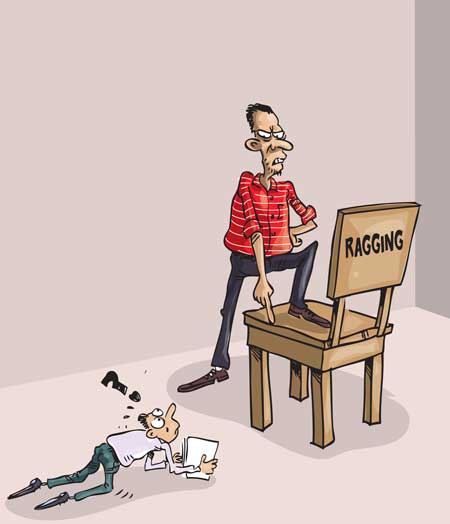Reply To:
Name - Reply Comment

According to the ‘Prohibition of ragging and other forms of violence in educational Institutions Act, No 20 of 1998’, ‘ragging’ is defined as “any act which causes or is likely to cause physical or psychological injury or mental pain or fear to a student or a member of the staff of an educational institution” and a perpetrator is liable to rigorous imprisonment for up to ten years. Despite the severe warning sounded by this act, ragging is continuing unabated and has become part of our student culture, so much so that refraining from ragging has become an anti-social attitude in our campuses.
The ragging menace disclosed
Disclosing the severity of ragging menace the law, the police had to arrest seven students of Kelaniya University following a complaint by a fresher. The arrested students were refused bail and further remanded. According to the complaint to the police, the victim female student had been ragged both physically and mentally.
The Dean of the Faculty of Humanities has revealed that the student had been subjected to ragging for a long period of time, that she had resisted the ragging, and had defended and stood up for herself constantly. This had led to physical abuse against which she had made a complaint.
Prof. Lakman Seneviratne, Dean of the Faculty of Humanities- University of Kelaniya.
“This incident took place just the day before the university closed as there was a water contamination. According to what the student told me, after her German class ended, six students surrounded her, scolded her and hit her on the head. She has fallen back and hit her head on the wall,” said Prof Lakman Seneviratne.
He added that she had tried to contact the Director for Students Affairs. “When she tried calling the Director for Student Affairs one ragger grabbed her mobile. But as the phone had rung the Director came to check up and was made aware of the incident. The Director was thus able to identify the students involved. The complaint was placed against the student who struck her and the student who grabbed her phone because she was physically harassed.”
Prof. Seneviratne also said that the student had been countering ragging for two months and that physical abuse was the trigger to placing a complaint. “It’s been two months since university opened for freshers and a particular dress code was imposed on them. For instance, freshers are not allowed to wear watches and they should wear slippers. This student did not adhere to this dress code and no one has the authority to force her to do so either. As a result she was verbally abused constantly for almost two months. The physical abuse was the culminating point of a series of events. She had also been pulled aside while walking into lecture halls and had been told what the ‘rules’ were. Despite the abuse she did attend classes.”
“She has been threatened that she would not be allowed into the university, that she would be sexually abused, that acid would be thrown on her face, that she would be cornered etc. Even first year students have threatened her but after the arrest it has stopped,” he added.
“We have also heard that second year students have dressed up as first year students to follow her. But the veracity of this has not been verified by any of the lecturers,” he noted.
“Out of those arrested only two students are directly connected to the attack. The University placed a complaint only against these two students. The others are those who had threatened her and they were traced through their telephone numbers. They were arrested as a result of the investigation by the police. Some first year students were arrested not because they ragged her but because they had threatened her,” he said.
Referring to what has been done to ensure the safety of the student in the university premises he said, “We have spoken to the Vice-Chancellor and have decided to provide a Marshall for her safety. I have advised all her lecturers to keep an eye on her safety as there’s a possibility that even first year students may harm her. I have also advised them to see that the student is safely accompanied by the Marshall after her classes.”
Former govt didn’t really look into ragging, but the new govt........
He said the following with regard to the arrest,
“When a student is physically or mentally ragged, we conduct an investigation. We are against the dress code policy that those who rag have implemented. However, the punishment that the government proposed was disproportional to the actions of the raggers. It was unfair to arrest seven students where two were from last year’s batch. Therefore they have been charged unfairly. The old government did not really look into ragging, but the new government is suddenly becoming concerned about ragging. They have even brought up problems and started intervening. However, government intervention is not really solving the problem.”
The Daily Mirror interviewed a large number of university students from Universities of Colombo, Kelaniya, Ruhuna and Moratuwa and almost everyone was against and critical of the ragging and was of the view that it should be done away with. However they did not want to be quoted or give their names, the names have to be changed to protect their identities.

They said that though they were permitted to refuse a rag, the culture prevalent forced them to accept it and that if they joined the anti-rag campaign they were discriminated against. Those staying in hostels were more susceptible to ragging because seniors found them a convenient venue for ragging. Victims have told us that extreme ragging took place in hostels especially at night where they were compelled to stand naked and obey orders of their seniors.
For students awaiting university entrance the quality or standard of the university is no longer a priority when choosing universities. They list out their university preferences based on the prevalence and severity of ragging. The experts interviewed were of the view that whether ‘mild’ or ‘rigorous’ ragging should be reported.
“Ragging at the Arts faculty is communal, so you get ragged based on your race. The ragging is worse for boys than for girls because there is physical ragging that goes on- I have a few friends who got beaten up with poles in the bathroom (until they bled from their ears) because they stood up to a senior.

And the ragging is far worse when you are a student staying in the university hostels- you can’t escape from the rag,” said Akarsha**, a fourth year student at the Arts Faculty of the Colombo university.
“One of my friends went to the police when he was assaulted by some boys from our batch (boys who were working with the senior raggers) because of what he was wearing. The policeman who took down my friend’s report was unconcerned that what had happened to him was because of ragging (even though my friend specifically told him that it was), and told him that what he was wearing made him look like a “rasthiyadukaaraya”; the policeman basically blamed my friend for what happened to him because he was wearing an earring,” she noted.
“You are “asked” to “participate” in the rag- they call it something else, under the guise of getting to know the new students and helping them find their way around university and Colombo in general. The seniors threaten to ostracize you if you don’t comply with their demands- and (while some students have no choice) others give in because they’re new to Colombo and the mere idea of ostracism is terrifying, and/or because giving in is the easier and safer option,” she added.
No jeans, no university
Referring to the milder forms of ragging another student said, “I was told not to wear jeans, (fancy) earrings, and shoes- we were told to wear simple skirts and blouses, and were told to carry this file around. We were also told that we had to stay in university till evening- regardless of whether we had lectures or not- and “get to know each other” at table talks. We were also told that we had to attend the meetings held in the afternoon (during the lunch break) by the seniors. A few of us avoided the table talks and meetings entirely by leaving the university premises immediately after our lecture was over, but most people weren’t so lucky- there would be a few seniors hanging around lecture rooms to “escort” (basically force) the first years to the meetings.” The file is given to ‘freshers’ (first year students) by seniors of the Union and freshers are required to carry it where ever they go so they are identified easily. “What usually happens is that you become an easy target for seniors who want to harass you.”
The undergraduates who spoke to the Daily Mirror stated that though officially there was a mechanism in place to stop ragging practically it was not effective. “A few of my batch mates were egged -- I’m still not sure why; possibly because we’re in the English medium-, and when they went to complain to the relevant person, he turned them away saying that he was having lunch, despite the fact that the entire preceding hour is officially allotted for lunch.”
Kelaniya university, worst place for ragging
“Ragging is definitely aggravated and enforced by the Student Union, but there are two factions at the Arts faculty and, one faction is pro-ragging while the other tries to distance itself from certain activities that fall under the rag,” she added. “Ragging and even this whole issue within the union is politically motivated, and the people behind it aren’t even within the university system,” she said. “However, it is important to note that not all seniors condone and perpetuate ragging.” Many students and experts were of the view that when it came to ragging Kelaniya University which has traditionally has a powerful student union which was earlier led by Janatha Vimukthi Peramuna and now Peratugami Samajawadi Peramuan (Frontline Socialist Party) is the worst place for ragging.

Raggers suffer from either border line personality traits or narcissistic personality traits
“Ragging is a phenomena found predominantly in Asian countries such as Sri Lanka, India and Pakistan. In 1975 Rupa Rathnaseeli from the University of Peradeniya was paralyzed after leaping off the second floor of a building to avoid a handle being inserted into her vagina. This was the first ragging related death reported as she committed suicide a few years later. In 1998 Varapragash from the Engineering faculty died of kidney failure. The autopsy report revealed that he was severely and aggressively ragged. In 2006 the Vice-Chancellor of the university of Sri Jayewardenepura resigned as students failed to comply with his orders to eliminate ragging. Samantha Vithanage, a third year management student who pioneered the anti-ragging campaign was killed while at a meeting on ragging. This is a menace!” said Dr. Kumaranayake.
“Victims end up with suicidal thoughts and refrain from entering universities. I had a first year university student suffering from social anxiety disorder(fear of being judged by others). He was asked to sing the lyrics of a vulgar song amidst a large crowd. He developed severe anxiety and suicidal thoughts. I directed him to extensive treatment and counselling through which we were able to save his life, “ he added.
Referring to the mental condition of raggers he said: “Raggers believe that ragging improves personality, emotional bonds and social shyness. This is false and is a myth. Raggers suffer from either border line personality traits or narcissistic personality traits. Borderline traits include being emotionally unstable, uncontrollable anger and feelings of emptiness. Narcissistic traits include the lack of empathy. They expect others to obey or respect them when they refuse to obey and respect others themselves. They are envious of others. Raggers with such personality traits are the leaders of ragging in universities. Then there are severe raggers suffering from an inferiority complex. They rag pretty girls or students from popular schools. Raggers believe that these students are swollen headed. These raggers are vulnerable to anxiety, lack self worth and have a poor self-esteem.”
“However, not all raggers suffer from mental disorders. Others follow them as a ‘tradition’. During the first few weeks at university students should be screened for such disorders. This could be easily done through the psychiatric department of universities. Raggers should be punished according to the law of the country as they are above 18 years of age.”

There has not been a unified voice against ragging
Dr. Harini Amarasuriya elaborated on the reasons as to why ragging has not been stopped. “It is now very much a part of a student sub culture. Authorities have not taken sufficient notice of it. Even some of the university staff believe that it is not a serious issue. There has not been a unified voice against ragging either among the students themselves or the staff or even the administration. If senior students collectively decided to put an end to ragging, it could be stopped. But students believe that this is part of the university culture and that they shouldn’t interfere.” She also said that ragging had been part of the British educational system and had transformed to what we see today.
She also added that there was a breakdown in trust between students and authorities while there were various forms of frustrations among students about their needs not being met. “There has not been a great conversation among the different parties to come up with a solution to stop ragging. Intervention to stop ragging has also been considered as an anti-student initiative.”